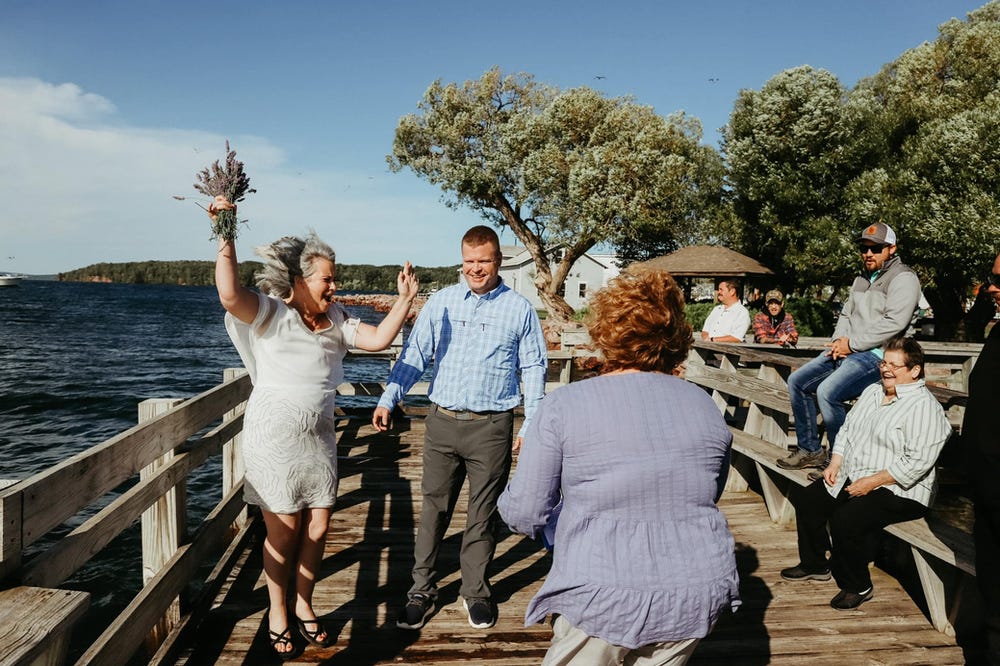Let's Talk About Grief, BaybEE
Let's Talk About Grief, BayBEE
Let's Talk About You and ME
Let's Talk About All The Weird Things That The Human Beeee-ings Do That Drive Us Crazeeee
Ok - if you grew up in the early 90's, or even if you didn't, you may recognize this song (or the horrible rendition I have in my head right now)...
Backstory:
I haven't been very active in my business the past few months because SO MUCH has happened. I got progressively sicker from the breast cancer therapy I was on, ended up in the ER a few times, and now we are hoping I'll get in to a specialty neurologist and cardiologist this fall.
The most important thing that happened? I got married!! Sam and I returned to Bayfield to get married on the shores of Lake Superior. This is me jumping for joy that we were starting the ceremony. Ha!
The thing I love about this photo? The woman on the right is Jim's (my late husband's) mom - looking just as happy as we are. My life is proof you can move forward from loss while keeping those that you love with you! Being open with her about my life and feelings, and her being open with me, has led to a relationship that supports both of us.
Which brings me to the point of this:
Talking about grief in the open is essential to a healthy life. Talking about it before it happens, after it happens, and what to expect in life when it does, brings it out into the light. Those conversations will help prepare you for the inevitable. We all will grieve in our lives.
I did not grow up talking about death and dying, but my late husband forced me to. He said he would die early in his life, and that I needed to know he would always be with me.
I am grateful for those conversations every day.
I wish, however, I had known what was "normal" in the grief process after he passed. I ended up in an abusive relationship with a person who was, among other things, *obsessed* with the stages of grief. (There are NO stages of grief for the griever, FYI, but that is a different article.)
For a long while, I thought what he said was true, because, well, I had no one to help me know what was ok or normal. I was in shock, had widow brain, and didn't know what to do or who to ask.
I wish someone had prepared me for the {even harder} second year of grief, or helped me date as a widow, or shown me the chronic health issues that come from grief, OR let me know it is healthy to still cry occasionally almost 10 years later.
Grief grows, and morphs, and is always a personal journey for the griever, no matter the type of loss or trauma.
I wrote on Facebook:
No matter your trauma or loss or *insert life issue here*, the key to it all is finding others who get your story and help you find your normal. Most people outside of your situation have no idea what "normal" is... find your people and ask Is this @#$% normal? 99% of your people will say - oh yeah, it's as normal as it gets in this f'ed up situation.
People who know, know, but we need to be louder about it all. So if you're grieving, talk about it openly! Be funny or sarcastic or sad or joyful in tragedy. Share it all, because someone needs to hear it.
If you aren't grieving, but you have a friend who is, listen, learn, and don't judge. Every one of us is on our own journey.
My aim has and always will be to bring these uncomfortable subjects into the open. I'm actually getting my Master's Degree in Thanatology - the study of death, dying, and bereavement.
Now if someone asks if something in grief is "normal" - I can actually tell them " oh yeah, it's as normal as it gets in this f'ed up situation. Here's a study on it."
Happy to be back in biz and looking forward to returning to talk about grief, baybeeee



